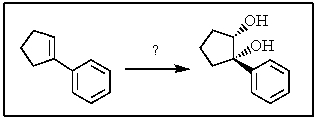A) ![]()
B) ![]()
C) ![]()
D) ![]()
E) ![]()
Correct Answer

verified
Correct Answer
verified
Multiple Choice
What reactant and product types would be most appropriate for the reagents shown? 
A) alkene/Markovnikov alcohol
B) alkene/anti-Markovnikov alcohol
C) alkene/1,2-diol
D) alkyne/1,2-diol
E) alcohol/alkene
Correct Answer

verified
Correct Answer
verified
Multiple Choice
Predict the major product of the following reaction: 
A) ![]()
B) ![]()
C) ![]()
D) ![]()
E) ![]()
Correct Answer

verified
Correct Answer
verified
Multiple Choice
What product,if any,would result from the reaction shown below? 
A) ![]()
B) ![]()
C) ![]()
D) both A and B
E) no reaction occurs
Correct Answer

verified
A
Correct Answer
verified
Multiple Choice
Reaction with ozone,followed by treatment with (CH3) 2S,of which of the following would not yield any CH3CHO?
A) ![]()
B) ![]()
C) ![]()
D) ![]()
E) Both B and D
Correct Answer

verified
Correct Answer
verified
Multiple Choice
What would be the major organic product of the following reaction? 
A) ![]()
B) ![]()
C) ![]()
D) ![]()
E) ![]()
Correct Answer

verified
Correct Answer
verified
Multiple Choice
Predict the product of the following reaction: 
A) ![]()
B) ![]()
C) ![]()
D) ![]()
E) Equal amounts of A and B.
Correct Answer

verified
Correct Answer
verified
Multiple Choice
Which of the following rearrangements would you not expect the cation below to undergo to any significant extent? 
A) ![]()
B) ![]()
C) ![]()
D) None of the above would occur to a significant extent.
E) All of the above would be significant.
Correct Answer

verified
Correct Answer
verified
Multiple Choice
Based on your knowledge of the mechanisms involved,which of the reagents below would you expect to accomplish the following reaction? (Think through the mechanism!) 
A) H2/Pd
B) Br2
C) PBr3
D) H2SO4
E) NaBH4
Correct Answer

verified
Correct Answer
verified
Multiple Choice
What would be the expected product from the reaction shown? 
A) ![]()
B) ![]()
C) ![]()
D) ![]()
E) ![]()
Correct Answer

verified
Correct Answer
verified
Multiple Choice
What would be the major organic product of the following reaction? 
A) ![]()
B) ![]()
C) ![]()
D) ![]()
E) ![]()
Correct Answer

verified
Correct Answer
verified
Multiple Choice
What reactant and product types would be most appropriate for the reagents shown? 
A) alkene/alcohol
B) alkene/anti-1,2-diol
C) alkene/syn-1,2-diol
D) alkyne/ketone
E) alkyne/aldehyde
Correct Answer

verified
Correct Answer
verified
Multiple Choice
Which of the following products is most likely to form under the reaction conditions? 
A) ![]()
B) ![]()
C) ![]()
D) ![]()
E) None of the above.
Correct Answer

verified
Correct Answer
verified
Multiple Choice
What would be the expected product of the following reaction? 
A) ![]()
B) ![]()
C) ![]()
D) ![]()
E) ![]()
Correct Answer

verified
B
Correct Answer
verified
Multiple Choice
Which reagents would be appropriate for the chemical transformation shown below? 
A) H2O,H2SO4
B) BH3,then H2O2, -OH
C) Hg(OAc) 2,H2O,then NaBH4
D) NaBH4,CH3OH
E) PCC
Correct Answer

verified
Correct Answer
verified
Multiple Choice
What reagent(s) would accomplish the following transformation? 
A) Br2,h
B) HBr
C) PBr3
D) HBr + peroxides
E) HgBr2 + NaBH4
Correct Answer

verified
Correct Answer
verified
Multiple Choice
Predict the major product of the following reaction: 
A) ![]()
B) ![]()
C) ![]()
D) ![]()
E) ![]()
Correct Answer

verified
Correct Answer
verified
Multiple Choice
What reactant and product types would be most appropriate for the reagents shown? 
A) alkene/syn-1,2-diol
B) alkene/anti-1,2-diol
C) alkene/alcohol
D) alkene/aldehydes and/or ketones
E) alkene/epoxide
Correct Answer

verified
D
Correct Answer
verified
Multiple Choice
Which of the reagents below would best accomplish the following transformation? 
A) H2O + cat.H2SO4
B) CH3CO3H,then NaOH + H2O
C) Br2 + H2O
D) O3 then Zn + HCl
E) KMnO4 + -OH/ H2O
Correct Answer

verified
Correct Answer
verified
Multiple Choice
How many products are possible in the reaction of trans-2-butene with Br2?
A) 0
B) 1
C) 2
D) 3
E) 4
Correct Answer

verified
Correct Answer
verified
Showing 1 - 20 of 44
Related Exams